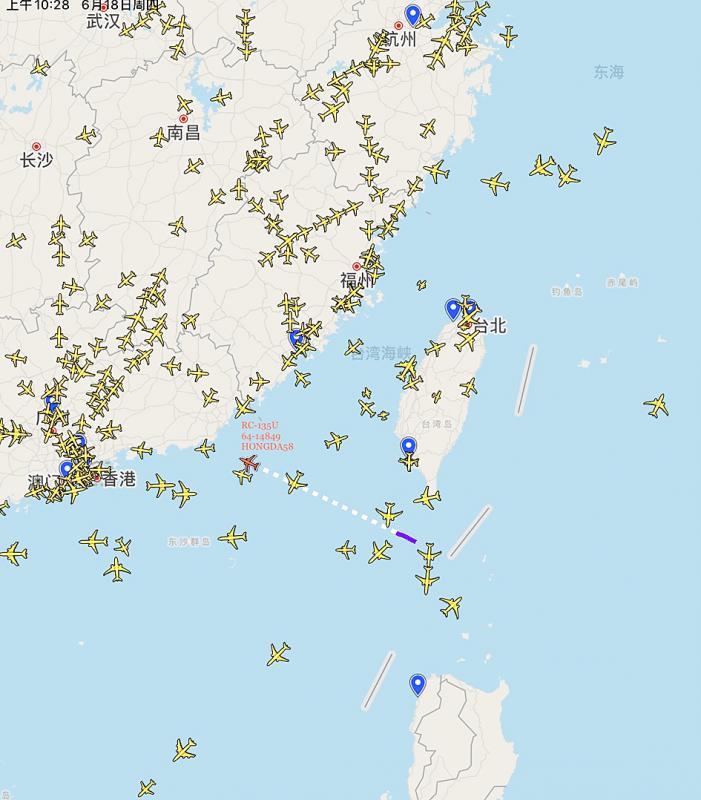The air force yesterday confirmed that two Chinese jets — a J-10 and a J-11 — flew into the nation’s air defense identification zone (ADIZ) before being chased away by its patrolling aircraft.
It was the fifth time Chinese jets had entered Taiwan’s southwestern zone this month and the third time since Tuesday, the air force said.
A US Air Force KC-135 Stratotanker refueling aircraft yesterday was sighted on the periphery of Taiwan’s northeastern zone, while a USAF RC-135 reconnaissance aircraft crossed the Bashi Channel to the southwest of the zone, the air force said, adding that it was looking into whether the appearance of US and Chinese aircraft in the same area was intentional or a coincidence.

Photo: Screen grab from Twitter
The information was provided by China’s South China Sea Strategic Situation Probing Initiative on its Twitter feed.
A growing number of US and Chinese aircraft flying over Taiwanese airspace indicates escalating US-China tensions in the region, Taiwanese military analysts said yesterday, adding that the timing of the Chinese incursion coincided with the appearance of the US aircraft.
The air force later yesterday said in a statement that it had detected the two Chinese fighters entering the nation’s southwestern airspace in the morning, but they left after being warned, adding that the situation in the nation’s airspace remains normal.
Previously, Chinese J-10 fighters and a Y-8 transport plane were sighted off the southwest of the nation’s zone on Wednesday, while a US C-40A transport plane was sighted passing over Keelung and exiting Taiwanese airspace off the coast of Tainan on Tuesday last week, the air force said.
Two US KC-135s flew over the East China Sea and the Bashi Channel on Tuesday, it added.

NATIONAL SECURITY THREAT: An official said that Guan Guan’s comments had gone beyond the threshold of free speech, as she advocated for the destruction of the ROC China-born media influencer Guan Guan’s (關關) residency permit has been revoked for repeatedly posting pro-China content that threatens national security, the National Immigration Agency said yesterday. Guan Guan has said many controversial things in her videos posted to Douyin (抖音), including “the red flag will soon be painted all over Taiwan” and “Taiwan is an inseparable part of China,” while expressing hope for expedited “reunification.” The agency received multiple reports alleging that Guan Guan had advocated for armed reunification last year. After investigating, the agency last month issued a notice requiring her to appear and account for her actions. Guan Guan appeared as required,

A Vietnamese migrant worker yesterday won NT$12 million (US$379,627) on a Lunar New Year scratch card in Kaohsiung as part of Taiwan Lottery Co’s (台灣彩券) “NT$12 Million Grand Fortune” (1200萬大吉利) game. The man was the first top-prize winner of the new game launched on Jan. 6 to mark the Lunar New Year. Three Vietnamese migrant workers visited a Taiwan Lottery shop on Xinyue Street in Kaohsiung’s Gangshan District (崗山), a store representative said. The player bought multiple tickets and, after winning nothing, held the final lottery ticket in one hand and rubbed the store’s statue of the Maitreya Buddha’s belly with the other,

‘NATO-PLUS’: ‘Our strategic partners in the Indo-Pacific are facing increasing aggression by the Chinese Communist Party,’ US Representative Rob Wittman said The US House of Representatives on Monday released its version of the Consolidated Appropriations Act, which includes US$1.15 billion to support security cooperation with Taiwan. The omnibus act, covering US$1.2 trillion of spending, allocates US$1 billion for the Taiwan Security Cooperation Initiative, as well as US$150 million for the replacement of defense articles and reimbursement of defense services provided to Taiwan. The fund allocations were based on the US National Defense Authorization Act for fiscal 2026 that was passed by the US Congress last month and authorized up to US$1 billion to the US Defense Security Cooperation Agency in support of the

CLASSIFIED BRIEFING: The ministry said the special budget focuses on building a comprehensive defense system and strengthening the domestic defense industry The Ministry of National Defense yesterday released information on seven categories of weapons systems to be procured under a stalled NT$1.25 trillion (US$39.57 billion) special defense budget, including precision artillery, long-range missiles, air defense anti-tank missiles and more than 200,000 uncrewed aerial vehicles (UAVs). The Executive Yuan approved a draft version of the budget on Nov. 27 last year and submitted it to the legislature for review. The legislature’s Foreign Affairs and National Defense Committee yesterday invited Minister of National Defense Wellington Koo (顧立雄) to deliver a classified briefing and answer questions at a closed-door session. Koo said he hoped to provide lawmakers